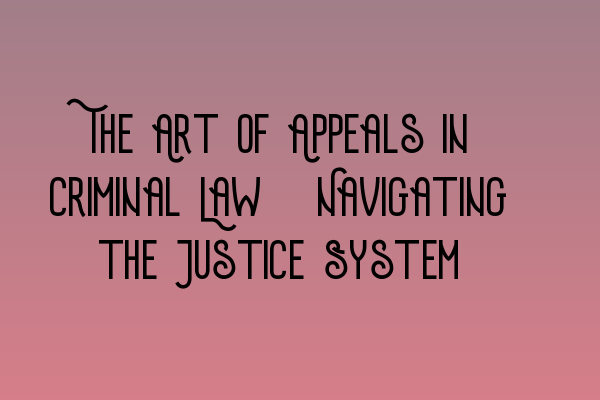The Art of Appeals in Criminal Law: Navigating the Justice System
Introduction
When it comes to criminal law, the journey doesn’t always end with a conviction or acquittal. Sometimes, individuals or their legal representatives may find it necessary to pursue an appeal. An appeal provides an opportunity to challenge a verdict, sentence, or even the entire trial process. In this blog post, we will explore the art of appeals in criminal law, discussing the key aspects and considerations involved in navigating the justice system.
Understanding the Basics
An appeal is the legal process through which a higher court reviews the decisions made by a lower court. In criminal law, an appeal can be initiated either by the defendant (appellant) or the prosecution (respondent) to seek a change in the outcome of a case. The appellate court doesn’t re-try the entire case but rather examines specific legal issues or errors raised by the parties.
Grounds for Appeal
The success of an appeal hinges upon identifying valid grounds for challenging the decision of the lower court. Some common grounds for appeal in criminal law include:
1. Errors in law: An appeal may be filed if there were errors in the application or interpretation of the law during the trial. This could involve incorrect instructions given to the jury or the misapplication of legal principles.
2. New evidence: If new evidence emerges after the trial that could significantly impact the outcome, an appeal may be pursued. The evidence must be fresh, credible, and capable of leading to a different verdict.
3. Procedural irregularities: Appeals can be based on procedural errors made during the trial, such as the exclusion of evidence or misconduct by the judge, prosecution, or defense.
4. Ineffective assistance of counsel: If the defendant can demonstrate that their legal representation was ineffective in a way that prejudiced their case, an appeal may be filed.
The Appeal Process
Navigating the appeal process requires careful strategy and an understanding of the legal system. Here are the key steps involved:
1. Filing a notice of appeal: The process begins by filing a notice of appeal with the appropriate appellate court within the specified time limit. Failure to file within the designated timeframe may result in the appeal being dismissed.
2. Preparing the appeal record: This involves gathering all relevant documents from the trial court, including transcripts, exhibits, and any other exhibits essential to the grounds of appeal.
3. Identifying the issues: The appellant’s legal team must identify the specific legal issues to be argued on appeal. Thorough research, attention to detail, and legal expertise are essential in this phase.
4. Drafting the appeal and submissions: The appellant’s legal team will prepare written grounds of appeal, outlining the arguments and legal precedents to support their case. This step requires strong writing skills and a persuasive legal argument.
5. Oral advocacy: In some cases, the appellant’s legal team may have the opportunity to present oral arguments before the appellate court. Effective oral advocacy skills are critical here, as they can significantly impact the outcome of an appeal.
6. Review by the appellate court: The appellate court will carefully review the appeal record, submissions, and oral arguments to make a decision. The judges will consider the law, the evidence, and the arguments presented by both parties.
7. Judgment and remedies: The appellate court will release a judgment, either upholding the lower court’s decision, quashing the conviction, imposing a new sentence, or ordering a new trial.
Conclusion
The art of appeals in criminal law requires a deep understanding of the legal system, strategic thinking, and effective advocacy skills. Navigating the justice system can be a complex and challenging process. Therefore, it is crucial to seek expert legal advice from professionals who specialize in criminal law and have a track record of appellate success.
At SQE Criminal Law & Practice Law UK, we take pride in our experience and expertise in handling appeals. Our team of solicitors combines legal knowledge, strong writing skills, and search engine optimization techniques to present compelling and persuasive arguments before appellate courts. If you are considering an appeal, contact us today to benefit from our professional guidance and advocacy.
